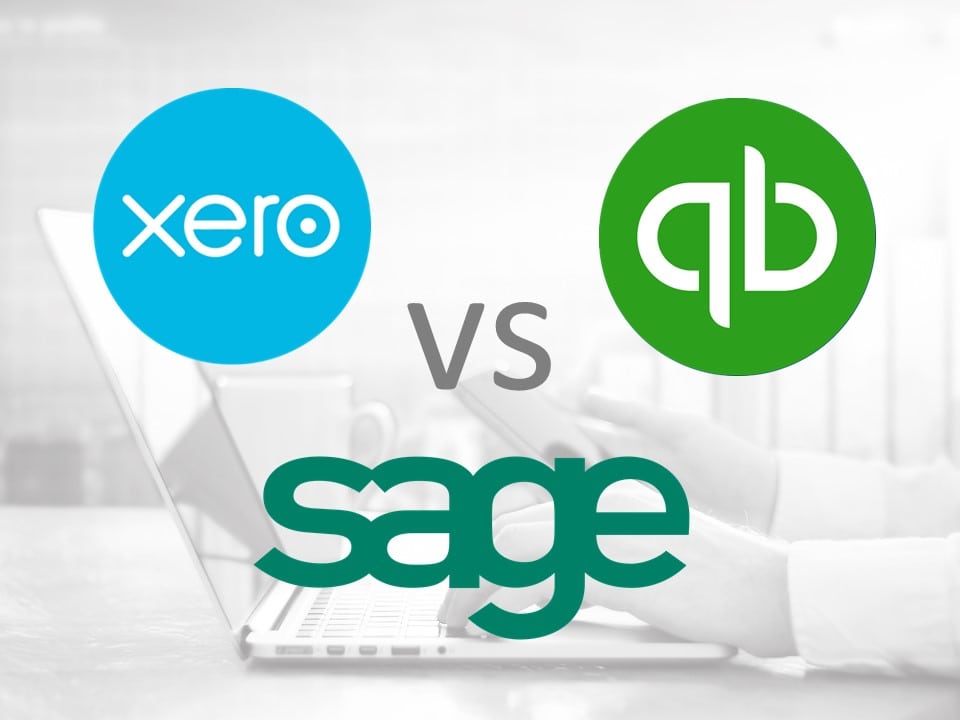Choosing the right accounting software can feel overwhelming. You want something that fits your business needs, saves you time, and keeps your finances clear.
Xero, QuickBooks, and Sage are three of the most popular options out there. But which one is truly the best for you? You’ll discover the key differences, strengths, and weaknesses of each. By the end, you’ll have a clear idea of which software will make managing your money easier and smarter.
Keep reading—you’re about to make a choice that could transform your business.
Key Features Compared
Choosing the right accounting software depends on its features. Xero, QuickBooks, and Sage offer many tools. Each has strengths in different areas. This section compares key features to help understand their differences.
User Interface And Ease Of Use
Xero has a clean, simple layout. It is easy to learn for beginners. QuickBooks offers a friendly dashboard with clear menus. Sage’s interface is a bit more complex but powerful. Users may need more time to explore it.
Invoicing And Billing
Xero supports customizable invoices and automatic reminders. QuickBooks allows quick invoice creation and payment tracking. Sage provides flexible billing but may require setup effort. Each software handles invoicing well but with small differences.
Expense Tracking
Xero lets users capture receipts and categorize expenses quickly. QuickBooks offers automatic expense imports from bank accounts. Sage tracks expenses with detailed reporting options. All three help keep expenses organized and easy to review.
Bank Reconciliation
Xero connects to many banks for automatic reconciliation. QuickBooks matches transactions and suggests corrections. Sage offers manual and automatic bank reconciliation tools. This feature speeds up monthly closing for all three.
Payroll Integration
Xero includes built-in payroll for some regions. QuickBooks provides strong payroll with tax calculations. Sage offers payroll as an add-on with robust features. Payroll handling varies but covers key needs across platforms.
Reporting And Analytics
Xero delivers clear financial reports with visual charts. QuickBooks offers customizable reports and real-time data. Sage provides in-depth reports but may be harder to customize. Reporting helps businesses understand finances better.
Pricing And Plans
Understanding the pricing and plans of Xero, QuickBooks, and Sage helps you pick the best fit. Each software offers different subscription costs and features. This section breaks down their prices, free trials, and overall value.
Subscription Costs
Xero plans start at a basic level and go up based on features. The lowest plan covers essential accounting tasks. Higher plans add more users and tools.
QuickBooks pricing begins with a simple plan for small businesses. More advanced plans include payroll and inventory options. Prices rise with added features.
Sage offers a range of plans from basic to premium. The cost depends on the number of users and modules included. It suits small to medium businesses.
Free Trials And Discounts
Xero provides a 30-day free trial for all plans. This trial lets you explore features without paying. No credit card is needed to start.
QuickBooks offers a 30-day free trial too. It allows testing the software fully. Discounts are available for new customers after trial.
Sage gives a free trial period, usually 30 days. It helps users test the software before buying. Occasional discounts appear on annual subscriptions.
Value For Money
Xero balances cost and features well for small businesses. It includes key tools like invoicing and bank reconciliation.
QuickBooks suits businesses needing strong payroll and tax features. Its pricing reflects added value in these areas.
Sage offers solid customization and scalability. It is good for growing businesses needing flexible options.
Integration And Compatibility
Integration and compatibility are key for accounting software. They help connect your tools and simplify tasks. Choosing software that works well with others saves time and reduces errors. It also supports your business growth as needs change.
Third-party App Support
Xero, QuickBooks, and Sage all work with many third-party apps. Xero offers over 800 app connections for sales, payroll, and more. QuickBooks also supports hundreds of apps, focusing on small business tools. Sage connects with fewer apps but covers major categories well. Each software lets you link apps to fit your workflow.
Mobile App Functionality
Mobile access is important for busy users. Xero’s app allows invoicing, bank reconciliation, and expense tracking on the go. QuickBooks offers a strong mobile app with features like income tracking and receipt capture. Sage’s mobile app covers basic tasks but is less comprehensive. All three apps work on iOS and Android devices for flexibility.
Multi-currency And Tax Support
Handling multiple currencies and taxes is vital for global business. Xero supports over 160 currencies with automatic exchange updates. QuickBooks handles multiple currencies and offers tax forms for many countries. Sage also supports multi-currency but may require extra setup for taxes. Each software helps manage complex international transactions with ease.
Security And Data Protection
Security and data protection are key when choosing accounting software. Small businesses trust these tools with sensitive financial information. It matters how Xero, QuickBooks, and Sage keep data safe. Each platform uses different methods to protect your data from threats. Understanding these methods helps you pick the right software for your needs.
Data Encryption
Xero uses strong encryption to keep data secure during transfer and storage. QuickBooks applies industry-standard encryption to protect user data. Sage encrypts data with robust protocols to prevent unauthorized access. Encryption ensures that data stays private and safe from hackers.
Access Controls
Xero allows setting user roles and permissions to control access. QuickBooks offers customizable access rights for different team members. Sage provides detailed access control to limit who can see or edit data. These controls help prevent unauthorized users from accessing sensitive information.
Backup And Recovery
Xero performs automatic backups to protect data from loss. QuickBooks saves copies regularly and offers recovery options. Sage includes backup systems to restore data quickly after incidents. Backup and recovery ensure your data stays safe even if problems occur.
Customer Support And Resources
Customer support and resources play a big role in choosing accounting software. Users need quick answers and clear guides. Each platform offers different support options and learning materials. This section compares the help you can expect from Xero, QuickBooks, and Sage.
Availability And Channels
Xero provides support through live chat and email. Phone support is limited and available in select regions. QuickBooks offers phone, chat, and email support. Their help is available during business hours. Sage has phone and email support. Some plans include 24/7 access. Response times vary between platforms.
Help Documentation
All three platforms have detailed online help centers. Xero’s guides are easy to follow with step-by-step instructions. QuickBooks provides extensive articles and video tutorials. Sage’s documentation covers common tasks and troubleshooting. Users can search topics quickly and find clear answers.
Community And Training
Xero hosts an active user community with forums and webinars. QuickBooks has a large user base and offers live training sessions. Sage features a community forum and online courses. These resources help users learn and solve problems. Training options suit beginners and advanced users alike.

Credit: www.cledara.com
Best Use Cases
Choosing the right accounting software depends on your business needs. Each software has unique strengths. Understanding their best use cases helps you make the right choice.
Small Businesses
Xero is great for small businesses that want simple, clear accounting. It offers easy bank connections and good invoicing features. QuickBooks also works well for small businesses, with strong expense tracking and reporting. Sage suits small businesses needing more control over inventory and payroll. All three can handle basic bookkeeping for small teams.
Freelancers And Contractors
QuickBooks is popular among freelancers. It helps track income, expenses, and taxes easily. Xero also fits freelancers who want automatic bank feeds and mobile access. Sage is less common for freelancers but offers solid invoicing tools. Freelancers benefit most from software that saves time on billing and tax reports.
Medium To Large Enterprises
Sage shines for medium and large businesses with complex needs. It handles payroll, inventory, and multi-user access well. QuickBooks can work for growing companies needing detailed reports and cash flow tools. Xero supports medium businesses with cloud-based collaboration and integration options. Enterprises need software that scales and manages many users smoothly.
Pros And Cons Summary
Choosing the right accounting software can be tough. Each option has its own strengths and weaknesses. Understanding these helps you pick the best fit for your business needs. Below is a clear summary of the pros and cons for Xero, QuickBooks, and Sage. This guide keeps it simple and easy to follow.
Xero Strengths And Weaknesses
Strengths: Xero offers a clean and easy-to-use interface. It supports unlimited users without extra cost. Its cloud-based system allows access from anywhere. Xero has strong invoicing features and integrates well with many apps.
Weaknesses: It can be pricey for small businesses. Some users find its reporting features limited. Payroll is only available in a few countries. Customer support response time can vary.
Quickbooks Strengths And Weaknesses
Strengths: QuickBooks is widely trusted with many features. It provides excellent reporting and financial tracking. The software supports payroll in many regions. It offers good mobile apps for managing on the go.
Weaknesses: Pricing plans can be confusing. The user interface may feel crowded. Only a limited number of users allowed on lower plans. Some advanced features require add-ons.
Sage Strengths And Weaknesses
Strengths: Sage is strong in inventory and project management. It offers scalable solutions for growing businesses. The software has robust accounting and compliance tools. It supports multiple languages and currencies.
Weaknesses: Sage can be complex for beginners. Its interface is less modern compared to others. Customer support may be slow. Pricing is often higher than competitors.
.1742779793975.png)
Credit: www.xero.com
Choosing The Right Software
Choosing the right accounting software is a key step for any business. It affects daily tasks and long-term growth. Each software—Xero, QuickBooks, and Sage—offers unique features. Understanding your business needs helps pick the best fit.
Assessing Business Needs
Start by listing what your business requires from accounting software. Do you need simple bookkeeping or advanced reporting? Consider features like invoicing, payroll, and tax support. Match these needs with what each software provides. This ensures smooth daily operations.
Evaluating Scalability
Think about your business growth plans. Will your software handle more transactions or users in the future? Xero, QuickBooks, and Sage differ in scalability. Choose software that grows with your business without extra stress or high costs.
Considering Budget Constraints
Set a clear budget for your accounting software. Prices vary based on features and user numbers. Look for software that fits your budget but still meets essential needs. Avoid paying for features you won’t use. Balance cost with value for best results.

Credit: steppingstone.io
Frequently Asked Questions
Which Software Is Best For Small Businesses: Xero, Quickbooks, Or Sage?
Xero is ideal for small businesses due to its user-friendly interface and cloud features. QuickBooks offers robust accounting tools and is widely used. Sage suits businesses needing advanced financial management and industry-specific solutions.
How Do Xero, Quickbooks, And Sage Compare In Pricing?
QuickBooks has tiered pricing with flexible plans. Xero offers straightforward monthly subscriptions with unlimited users. Sage pricing varies based on features and business size, often tailored for larger enterprises.
Can Xero, Quickbooks, And Sage Integrate With Other Apps?
All three support integrations. Xero connects with over 800 apps. QuickBooks offers extensive third-party app compatibility. Sage provides integrations, especially with Microsoft products and industry tools.
Which Software Offers Better Invoicing Features?
QuickBooks excels in customizable invoicing and automation. Xero provides easy invoice creation and tracking. Sage offers strong invoicing but focuses more on comprehensive financial management.
Conclusion
Choosing between Xero, QuickBooks, and Sage depends on your needs. Each software has strong features for accounting tasks. Xero offers easy online access and good collaboration tools. QuickBooks is popular for small businesses and simple invoicing. Sage provides robust options for larger companies and complex finance needs.
Think about your budget, business size, and required features. Test each option if possible to see what fits best. Clear, simple tools help manage your money well. Your choice should make accounting easier and save time.
